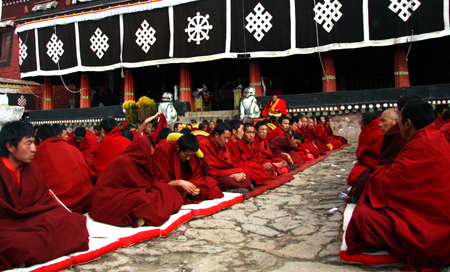With his New Year message on Wednesday, the Dalai Lama once again proved his hostility toward his fellow Tibetans and his motherland.
As a long self-claimed Buddhist, the Dalai Lama should have focused on spreading Buddhist tenets and culture instead of showing an extreme interest in politics in an attempt to intervene in the country's political process under religious guise.
A few years ago, the Dalai Lama stopped playing any official role in the so-called Tibetan government in exile. That should have offered him a chance to be committed to Buddhism and make contributions for its development. Unfortunately, the Dalai Lama has chosen otherwise.
|

|
|
Monks pray at Nequng Monastery in Lhasa, capital of southwest China's Tibet Autonomous Region, Feb. 26, 2009. With his New Year message on Wednesday, the Dalai Lama once again proved his hostility toward his fellow Tibetans and his motherland. (Xinhua/Ren Xiaogang) |
In his message to his compatriots on the eve of the Tibetan New Year, the Dalai Lama once again demonstrated his lack of basic knowledge about the country's legal system as well as a lack of common sense that religion is separated from politics worldwide.
Given his religious background and identity, the Dalai Lama should be disqualified from talking about politics at any time.
In his message, the Dalai Lama claimed that the large-scale "peaceful protests" launched in Tibetan-inhabited regions last year caused hundreds of deaths. His remarks are a serious denial of facts.
It is true that organized unrests and violence did occur in Tibet and beyond, but they were only confined to a small part of Tibetan-populated areas, not the whole area as the Dalai Lama claimed.
Enough material and facts indicate that an overwhelming part of the Tibetan region enjoyed a peaceful, stable and tranquil environment last year. Even last March, when Lhasa, capital of the Tibet Autonomous Region, experienced a bloody riot, the rest of the region still remained stable.
The Dalai Lama was also wrong when he used the phrase "peaceful protest." Available facts have indicated that participants in the violence chose to use sticks, clods, stones and swords not only against security forces, who always maintained self-restraint in trying to restore stability in the region, but also against civilians, including shop owners, tourists and passersby.
His remarks that "hundreds of Tibetans lost lives" also proved to be a sheer lie. To restore peace and stability, the local government maintained self-restraint from the beginning of the outbreak of the riot. Persuasive talks and warnings were used to deal with violence. In that round of violent clashes, a total of 18 civilians died, not hundreds as the Dalai Lama put it. And they were beaten or burned to death by the rioters. Obviously, there exists an ulterior intention behind his lie.
On Feb 11, the Dalai Lama claimed that "the situation in Tibet is very strained, and incidents might burst out". In his New Year message two weeks later, he demanded that Tibetans should not take any action in a hasty manner.
The change of tones are obviously aimed at creating and disseminating a tense atmosphere in Tibet in an attempt to tell more people it is time to rise up and riot. Such practices will unavoidably cause people to heavily doubt whether the so-called Tibetan spiritual leader wants a peaceful and stable or a turbulent Tibet.
The answer is absolutely clear to all.
In his New Year speech, the Dalai Lama also hoped Tibetans care and value life and avoid violence. However, there are also exposed motives behind his words. On one hand, he aims to encourage extremist Tibetans to use violence, and on the other hand prepare a pretext in advance to evade his own responsibility in case unexpected things happen.
Since Chinese people have dealt with the Dalai Lama for ages, we are quite capable of grasping his overtones. Despite staying overseas for a long period as a religious figure, the Dalai Lama has never stopped his intervention in the country's politics.
Thus, he is completely incapable, morally or physically, to confront with the irreversible current of the national unity. Being such a busy person flying around the world, the Dalai Lama should have contributed to disseminating the essence of Buddhism.
However, he has chosen to sacrifice self-dignity and succumb to other countries' attitudes by distorting facts and fermenting riots. All his motives are doomed to failure.
As a religious figure, the Dalai Lama should conform to the historical trend of the national unification and focus on Buddhist teachings. His choice of a religious career should not be distracted by other affairs.
If he really cares about the Tibetans just as he said, the Dalai Lama should abide by the country's laws and sincerely put himself under the leadership of the central government, and take real actions to be a good Chinese citizen.
The author is director of the Center for American Studies at the Shanghai-based Fudan University.
(China Daily March 2, 2009)